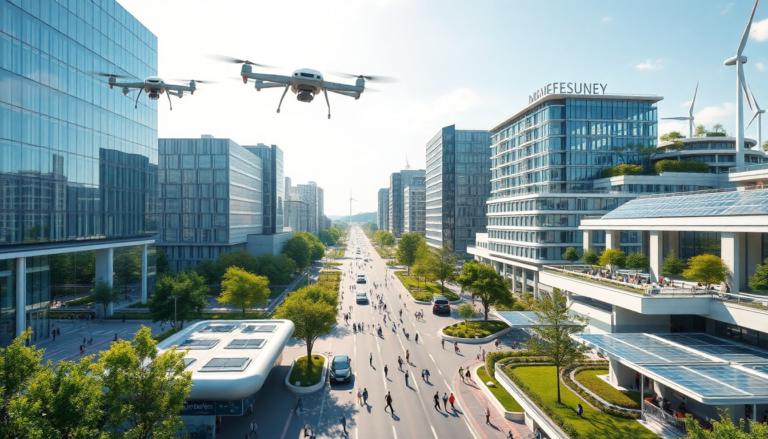Argomenti trattati
- Artificial intelligence will be omnipresent
- Quantum computing will tackle unsolvable problems
- 5G and 6G will transform connectivity
- The metaverse and spatial computing will change digital interactions
- The future of work will be hybrid, automated, and skill-based
- Smart cities will become standard
- Cybersecurity and privacy will shape trust in the digital landscape
As we advance further into the 2020s, the pace of technological evolution is accelerating at an unprecedented rate, fundamentally altering our lifestyles, work environments, and connections. From artificial intelligence to quantum computing, the innovations on the horizon are set to define the world we inhabit by 2030 and beyond. In this article, we will delve into seven revolutionary technologies that are poised to transform our future, highlighting why it is essential for businesses, governments, and individuals to start preparing now.
Artificial intelligence will be omnipresent
The scope of artificial intelligence (AI) is expanding beyond mere voice assistants and chatbots. In the coming decade, we can anticipate that AI will be woven into every facet of business and society. We are entering a new era of explainable AI, wherein machines not only make decisions but also provide transparent justifications for those decisions. Industries such as healthcare, finance, education, and agriculture will increasingly depend on AI-driven predictive analytics to enhance efficiency and results.
Furthermore, generative AI technologies, including large language models like OpenAI’s GPT, will transition from being simple assistants to active co-creators. They will aid in product design, code writing, content drafting, and even artistic creation, revolutionizing the creative process.
Quantum computing will tackle unsolvable problems
Though still in its early stages, quantum computing is on the brink of disrupting numerous industries that rely on complex simulations and calculations. Innovations from companies like IBM and Google, as well as startups such as IonQ and Rigetti, target challenges that classical computers cannot solve in a reasonable timeframe, from drug discovery to climate modeling.
By 2030, the concept of “quantum advantage” will become commonplace as businesses harness cloud-based quantum services for optimization, breaking encryption, and designing materials at unprecedented speeds, thus reshaping problem-solving methodologies across sectors.
5G and 6G will transform connectivity
With the rollout of 5G networks already underway globally, the advent of 6G is anticipated by the early 2030s. These next-generation networks promise ultra-fast, low-latency connectivity, enabling real-time immersive experiences such as remote robotic surgery and cloud gaming.
The Internet of Things (IoT) will be significantly enhanced by this connectivity, propelling the development of smart cities, autonomous vehicles, and interconnected manufacturing facilities on a scale previously unimagined.
The metaverse and spatial computing will change digital interactions
While the initial hype surrounding the metaverse may have subsided, the underlying technologies—augmented reality (AR), virtual reality (VR), and spatial computing—are steadily advancing. Tech giants like Apple, Meta, and Microsoft are creating ecosystems where the boundaries between digital and physical realities blur.
By 2030, experiences such as attending virtual concerts, collaborating in 3D workspaces, or purchasing real estate in digital replicas of cities could feel as intuitive as browsing the web today. Advances in wearable extended reality (XR) devices and haptic technology will further enrich our immersive experiences in the digital realm.
The future of work will be hybrid, automated, and skill-based
Technology is dramatically reshaping our work landscape. With AI and automation taking over repetitive tasks, employees will be free to concentrate on creativity, collaboration, and emotional intelligence. The gig economy is expected to flourish, bolstered by blockchain-based identities and payment systems.
As a result, continuous digital upskilling will become crucial. Companies will prioritize hiring based on skills rather than degrees, leveraging AI to match workers with micro-jobs across global platforms, creating a flexible and dynamic workforce.
Smart cities will become standard
As we approach 2030, over 60% of the global population is projected to reside in urban areas, leading to an urgent need for urban innovation. Smart cities, powered by data analytics, IoT, AI, and sustainable technologies, will focus on improving efficiency, sustainability, and resilience.
We can expect to see autonomous public transportation systems, AI-managed energy grids, digital citizen services, and real-time waste and water monitoring—all aimed at minimizing environmental impacts while enhancing the quality of life for residents.
Cybersecurity and privacy will shape trust in the digital landscape
With increasing connectivity, the importance of cybersecurity and data privacy is more pronounced than ever. The cybersecurity sector is evolving towards proactive defense mechanisms, employing AI to identify anomalies before breaches occur. Innovations like decentralized identity systems and privacy-enhancing technologies will empower users to maintain greater control over their personal data.
Organizations prioritizing digital trust will gain a competitive advantage as consumers and regulators alike become more aware of privacy issues, underscoring the importance of ethical practices in the digital age.

